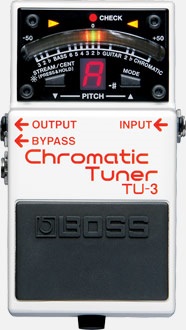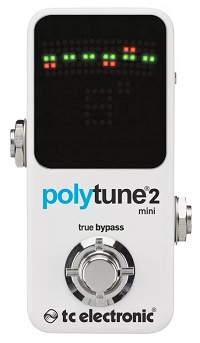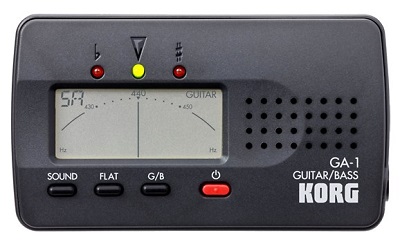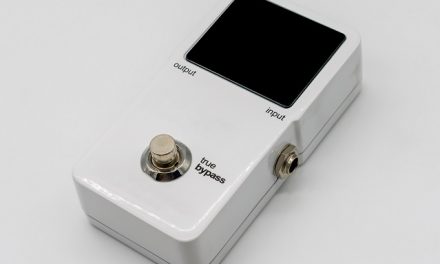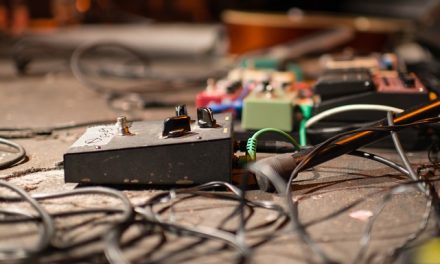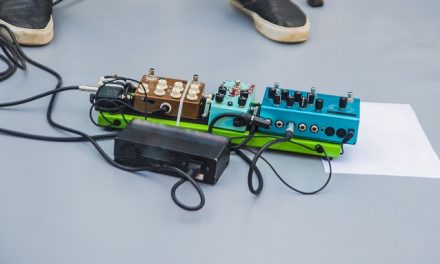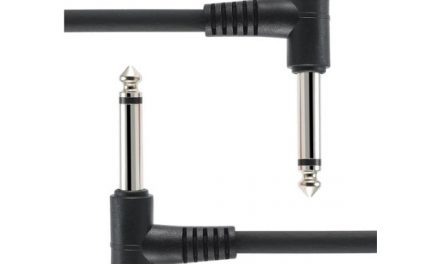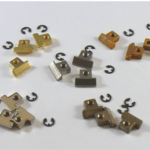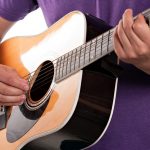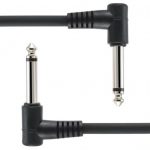Any links on this page that lead to products on Amazon are affiliate links and I earn a commission if you make a purchase. Thanks in advance for your support!
5 Best Guitar Tuners For Electric Guitars
Keeping your electric guitar in tune is just part of playing an instrument with strings.
Because guitar strings regularly lose tension and go out of tune due to temperature, humidity, age, condition, and more, it’s necessary to be able to tune your guitar quickly and accurately.
Rather than do it by ear, almost all guitarists opt for a tuner.
As guitar gear goes, tuners are pretty straightforward devices. Electronic tuners make the process much easier and are more accurate than trying to tune by ear.
When it comes to choosing a tuner, there are many options on the market today and settling on the tuner that’s right for you can seem like a daunting task.
In this guide, we’ll outline that different types of devices that are available today, as well as review the best guitar tuners for electric guitars in the various categories.
Here are the five best tuners for acoustic guitars that we’ll be covering:
5 Best Guitar Tuners For Electric Guitars
- Boss TU3 Chromatic Tuner Pedal
- TC Electronic PolyTune 2 Mini Chromatic Tuner
- Korg GA1 Guitar and Bass Chromatic Tuner
- Korg PB05 Pitchblack Pro Rackmount Chromatic Tuner
- VITALtuner Chromatic Tuner for iOS
Bonus High-End Rackmount Guitar Tuner
Review Criteria
All guitar tuners included in my reviews were selected based on their widespread use and reputation in the professional music community and from personal use and knowledge.
I’ve also added my insights gained from my 25+ years of experience running a very successful music production company, plus working with dozens of composers and thousands of tracks for my Audio Addiction Music Library, a production music library with global distribution.
What To Look For In An Electric Guitar Tuner
Chromatic vs. Non-Chromatic Tuners
It’s important to realize that there are chromatic and non-chromatic tuners available to purchase.
Chromatic tuners let you tune any note in a musical scale. They also allow you to tune to reference notes like A440 (the standard pitch reference)
Chromatic tuners are very handy if you use alternate guitar tunings such as dropped D, or want to tune your guitar in a non-standard way.
Non-chromatic tuners only let you tune to specific notes, such as the six strings of a guitar.
Though non-chromatic tuners are easier to use for beginners, chromatic tuners are more versatile and don’t cost any more than regular tuners. You can also use a chromatic tuner to tune other instruments like electric bass, mandolin or ukulele.
So the bottom line is this: Always get a chromatic tuner! All the tuners we recommend are chromatic tuners.
Four Types of Guitar Tuners
There are four main categories of guitar tuners for electric guitars:
- Pedal tuners
- Handheld tuners
- Rackmount tuners
- Mobile Phone App tuners
Pedal Tuners
Pedals are the most common tuners for electric guitar tuners. They are easy to use, highly accurate, and can be left connected to the guitar at all times.
Pedal tuners generally feature an LED display that can easily be read in a dark setting like a stage, making them suitable for live situations as well as home or studio use.
Guitarists who are already using effects pedals as part of their setup will have no trouble including one in their effects pedalboard. This is ideal for performance settings, as the tuning pedal will be ready to go when you need a quick tune-up on stage.
Handheld Tuners
Handheld tuners are another popular option. Handheld tuners have been tuning mainstays since Korg introduced the Korg W10 tuner in 1975, which then inspired a whole wave of copycats that imitated their small design and low price point.
Depending on the design, handheld tuners use an analog needle or a digital readout of the pitch of each string as it is plucked.
Some models also come with a microphone to allow tuning without plugging in.
While some can be left plugged into your guitar effects chain, handheld tuners are used more often in home and studio applications, not on stage.
Rackmount Tuners
Rackmount tuners are high-quality tuners designed for professional players and studio use.
They are frequently used by guitarists who use rackmount effects rather than pedals. Because of their larger size, rackmount tuners are able to utilize more sophisticated software and advanced tuning features.
The downside of rackmount tuners is that you give up some of the portability that handheld and pedal tuners provide, and they are generally quite a bit more expensive than other tuner options.
Mobile App Tuners
With everyone today owning a smartphone, it was inevitable that app developers would create guitar tuning apps.
While there are plenty of tuning apps to choose from these days, the majority of them are free, and many of the free versions leave a lot to be desired.
However, paid tuner apps are really very inexpensive (most are under $5.00) and can be a great value for the money.
Most tuning apps rely on your smartphone’s mic rather than a direct line in. The result is that they just aren’t very usable in noisy environments.
That being said, they’re obviously very convenient, and it’s not a bad idea to keep one on your phone as a backup.
Best Guitar Tuners for Electric Guitar Reviews
Boss has been making guitar tuners for decades, and the Boss TU3 is one of the most popular guitar tuners on the market.
Boss pedals are preferred by guitarists for their rugged, high-quality construction that will stand up even to heavy-footed players who stomp on them.
If you’ve ever owned one, it’s not hard to understand why it’s a workhorse in the tuner world. Their tuners seem to last forever!
This pedal can be used by guitarists and bassists alike and includes support for seven string guitars and drop-tuned instruments up to six semitones below standard tuning.
The TU3 features a 21-segment LED indicator that will tell you whether you’re sharp, flat or in tune, allowing you to adjust as needed.
The LED lights are bright and can easily be read, and the unit even includes a high brightness mode makes tuning easier on dark stages.
True Bypass Mode
For pedalboard users, The TU3 has a true bypass mode. This means that when the pedal is bypassed (off), the signal is routed straight from input to output. The bypass of the tuner’s circuitry removes any capacitance loading, buffering, or coloration of the signal passing through the tuner and keeps your guitar signal as pure as possible.
Battery or Power Supply
The pedal is powered by one standard 9V battery or can be used with the Boss PSA120 power supply (sold separately). The power supply can also be used to daisy chain power to other pedals.
Three standard ¼ inch jacks support input and output connections, plus the bypass mode.
It’s a tuner that does not disappoint. Highly recommended!
PROS
- Heavy-duty construction
- Highly accurate
- Bright visual display
- True bypass mode
CONS
- More expensive than most handheld tuners
- Does not include power supply
Boss TU3 Chromatic Tuner Pedal
Check Price:
Amazon | Guitar Center | Zzounds
Another great pedal tuner is the TC Electronic PolyTune 2 Mini. It’s a very precise strobe tuner with tuning accuracy to 0.1 cents.
It comes in a tiny package that is half the size of a regular guitar effects pedal. It will fit into just about any pedalboard, no matter how crowded.
The PolyTune2 has a polyphonic mode that is capable of simultaneously tuning all six of your strings at once! Just strum a chord, and Polytune automatically tells you which strings are out of tune.
For guitarists who are used to switching tunings mid-performance, a polyphonic tuner may be a huge advantage.
While it’s possible to tune all strings at once, the PolyTune 2 also supports tuning each string individually, as well as using alternate tunings. It’s simple – if you play a chord Polytune goes into polyphonic mode; if you play a single string, it switches to a standard chromatic tuner mode.
It also features a true bypass switch, which will appeal to players who don’t want any coloration of their sound from additional in-line pedals when using a pedalboard.
The PolyTune 2 is powered by a standard 9V battery.
The display has 109 LEDs has been designed to be bright enough for use in dark venues or even in bright sun.
Other great features include the ability to save tuning presets, and a tuning magnet that helps the display needle get more accurate readings
All in all, TC Electronic has designed a highly accurate pedal tuner that is easy to carry around, has advanced tuning features, and is budget-friendly.
PROS
- Polyphonic tuning or chromatic tuning modes
- Small size ideal for travel or crowded pedalboards
- True bypass mode
CONS
- Polyphonic tuning may be difficult to use for people used to single string tuning
- Power supply not included
TC Electronic PolyTune 2 Mini Chromatic Tuner
Check Price:
Amazon | zZounds | Guitar Center
The Korg GA1 is one of the best electric guitar handheld tuners available due to its ultra-compact size, ease of use and low price tag.
And it has the Korg name – Korg has been a major manufacturer of quality music gear for many decades.
The GA1 is designed for both electric guitar and electric bass with both Guitar and Bass modes. It also supports up to 7-string guitars and 6-string basses. It’s powered by 3 AAA batteries.
It also has a built-in mic that lets you tune acoustic instruments that cannot be plugged in, like acoustic guitars, ukuleles, mandolins, or dulcimers.
The GA1 features an LCD display screen that lets you know if you’re sharp, flat or on pitch. The interface is easy to use, with a green light that becomes illuminated once you’re in tune.
The GA1 also features a flat tuning mode that lets you tune 1-5 semitones flat if needed.
There’s also has a built-in speaker that will output a reference tone if you want to tune by ear.
Like most handheld tuners, the GA1 is better suited for at home or studio use rather than on-stage use. The tuner does feature a true bypass output jack, however, meaning it is possible to use it in a live setting if you so desire.
In fact, many guitarists who use a tuning pedal or rackmount tuner will still use a handheld tuner for off-stage purposes, so it’s never a bad idea to have one in your setup.
PROS
- Inexpensive yet highly accurate
- Very portable
- Easy to use
CONS
- Less practical for live performance
- Easy to misplace due to small size
Korg GA1 Guitar and Bass Chromatic Tuner
Check Price:
Amazon | zZounds | Guitar Center
Korg was the first manufacturer to make a rackmount tuner, the DT-1 Pro which appeared in 1987.
The Korg PB05 continues that legacy with a single space rack tuner packed with modern technology that’s priced affordably for studio or stage use.
The unit has three tuning modes –regular, strobe, and half-strobe – that gives you the flexibility to choose the best tuning options.
What is striking about the PB05 is its 3D visual meter that gives a three-dimensional representation of the note you are tuning.
Because it is lightweight, it’s also designed to be used outside a rack, so you are not limited to stage or studio use.
It also comes with a mute function that lets you tune up without outputting any sound, perfect for on-stage use.
Korg has incorporated a very nice feature not typically found in a tuner– a cable checker – that will tell you if a cable is broken. That’s a convenient feature for both stage and studio use.
And best of all, Korg has somehow incorporated all these features into a rackmount tuner under $100.
PROS
- Inexpensive yet highly accurate tuner
- Ultra-lightweight design can be rack-mounted or used outside a rack
- For both guitars and bass
CONS
- Larger size is not as portable as handheld or pedal tuners
- More expensive than many handheld or pedal tuners
With the explosion of smartphone apps, it’s not surprising to see that a variety of guitar tuning apps have hit the market over the last several years.
There are many free tuners out there but most are very basic or don’t work very well.
While guitar tuning apps for electric guitar are not ideal due to the fact they use a microphone, VITALtuner is a very accurate tuner that offers a lot of other exciting features. And at less than $5.00 it is very inexpensive.
And it’s available for both Android and iOS smartphones.
First off, VITALtuner comes equipped with four different user modes: advanced, easy, stage and stage bright. You can choose the one that best fits your needs.
The visual display in the app is based on the classic needle style pitch indicator, making it easy to use.
The app is also programmed to support 130 alternate tunings besides guitar, including banjo, mandolin, and bass, even wind instruments such flute or oboe.
Lastly, VITALtuner lets you choose 100 different temperaments based on historical instruments and “sweeter tunings” that make subtle adjustments to how your instrument is tuned. This is handy for music students or anyone wanting to tune their instrument in the most authentic manner possible.
PROS
- Very inexpensive
- Plenty of interesting modes to use
- Convenient to use
CONS
- Tuning through your phone’s mic makes it less accurate
- Not great in noisy environments
If you want the best and money is not a concern, check out the Peterson VS-R StroboRack Chromatic Tuner.
For guitarists who prefer rackmount equipment, the Peterson VS-R StroboRack is at the top of the electric guitar rackmount tuners list.
The StroboRack is a highly accurate chromatic strobe tuner, with accuracy up to 1/10th of a cent, which is up to 30x more accurate than a standard needle or LED tuner.
This tuner features a sizeable LCD display screen for easy viewing as you tune, as well as the ability to choose between manual and automatic note display to suit your needs.
The StroboRack has much more to offer than your standard tuner. Included are a range of tuning modes as well as 25 tuning presets for acoustic guitar, DADGAD, 12-string guitar, baritone guitar, E9th, C6th & Universal steel guitar, Dobro and resonator guitar, and electric violin. It also includes tuning and intonation offsets for Buzz Feiten Tuning System equipped guitars.
These features will really come in handy if you’re a performing guitarist who has to switch between multiple tuning setups during a gig, or a studio guitarist doing lots of sessions.
The StroboRack features a durable metal construction that can stand up to the rigors of touring, and Neutrix jacks for long-lasting dependability.
It’s not cheap, but if you need the best, this is the tuner to get!
PROS
- Highly accurate for professional applications
- Large display size makes it easy to tune onstage
- Lots of advanced features
CONS
- Expensive
Conclusion
The type of guitar tuner you purchase will ultimately come down to how you intend to use it.
If you’re a working guitarist heading out on tour, your best bet will be to go with a pedal or rackmount tuner, as these are very accurate and better suited for stage use.
Guitarists who just need a quick tune-up during practice sessions at home or in the studio may want to forego the bigger budget required by pedals and rackmount gear though in favor of a handheld tuner or a smartphone app, as these will be enough to get the job done.
And finally, as many tuners are quite inexpensive, some guitarists end up buying multiple tuners, if for nothing than to have some backups. It’s never a bad idea to have a few different options in your guitar case.

